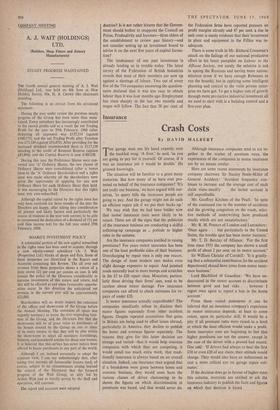Insurance
Crash Costs
By DAVID MALBERT
FrHE garage man ran his hand expertly over I the buckled wing. 'A fiver,' he said, 'as you are going to pay for it yourself. 01 course, if it was an insurance job it would be double.' He grinned knowingly.
The situation will be familiar to a great many motorists. But how many of us have ever pro- tested on behalf of the insurance companies? 'It's not really our business,' we have argued with our- selves, 'to query bills the insurance people are going to pay. And the garage might not do such an efficient repair job if we put their backs up.'
We may wish that we had been bolder now that motor insurance rates seem likely to be raised. There are all the signs that the publicists of the insurance business are conducting a skilful softening-up campaign as ,_ prelude to higher rates in the autumn.
Are the insurance companies justified in raising premiums? For years motor insurance has been one of the least profitable sides of their business. Overcharging by repair men is only one reason. The design of most modern cars makes even slight damage expensive to repair. And jammed roads naturally lead to more bumps and scratches in the £5 to £20 repair class. Motorists, particu- larly those driving their firms' cars, tend to be careless about minor damage. Few insurance companies can afford to check estimates for re- pairs of under £20.
Is motor insurance actually unprofitable? The companies steadfastly refuse to disclose their motor figures separately from other accident figures. Despite repeated accusations that gains in Britain are being used to offset losses abroad, particularly in America, they decline to publish the home and overseas figures separately. The reasons they give for this latter decision are strange and varied—that it would help overseas companies with which they are competing, it would entail too much extra work, that tradi- tionally insurance is always based on an overall situation. Indeed, one insurance man argued that if a breakdown were given between home and overseas business, they would soon have the various classes of driver clamouring to be shown the figures on which discrimination in premiums was based, and that would never do. Although insurance companies tend to act to- gether in the matter of premium rates, the experiences of the companies in motor insurance are by no means similar Here are some recent statements by insurance company chairmen. Sir Stanley Norie-Miller of General Accident : 'Accident frequency con- tinues to increase and the average cost of each claim risest steadily the motor account is still unprofitable.
Mr. Geoffrey Kitchen of the Pearl: 'In spite of the continued rise in the number of accidents and the growing congestion on the roads, selec- tive methods of underwriting have produced results which are not unsatisfactory.'
Mr. R. M. Preston of London and Lancashire: 'Once again . . . but particularly in the United States, the trouble spot has been motor business.'
Mr. T. D. Barclay of Alliance : 'For the first time since 1953 the company has shown a small profit of about 2 per cent. on its motor account.'
Sir William Christie of Cornhill 'It is gratify- ing that a substantial contribution [to the accident department] shouid have come from motor insur- ance business.'
Lord Blackford of Guardian : 'We have en- deavoured in the motor account to discriminate between good and bad risks . . . however I regret once again to report a loss in the home account.'
From these varied statements it can be inferred that an Insurance company's experience in motor insurance depends, at least to some extent, upon its particular skill. It would be a pity if all premium rates were raised to a level at which the least efficient would make a profit. Some insurance men are beginning to feel that higher premiums are not the answer, except in the case of the driver with a proved bad record. One said : 'If drivers had always to bear the first £10 or even £20 of any claim, their attitude would change. They would also have an inducement to cast a more critical eye on garage repair esti- mates.'
If the decision does go in favour of higher rates this autumn, motorists are entitled to ask the insurance industry to publish the facts and figures on which that decision is based.










































 Previous page
Previous page